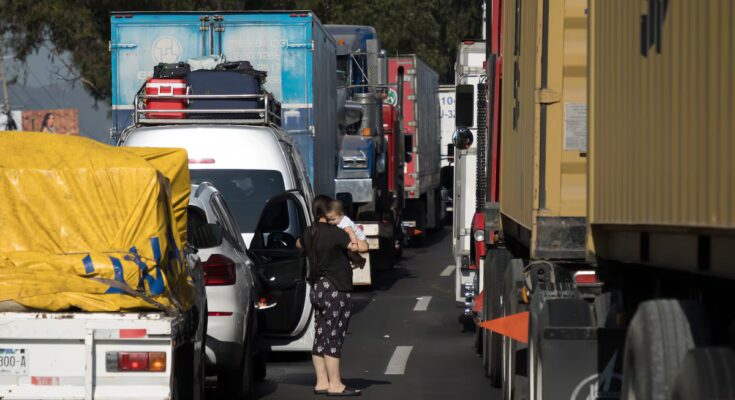This is an episode of the weekly newsletter from Mexico, which can be followed for free at this link.
Someone said that a few kilometers away there was a small stall where you could buy water and something to satisfy your hunger. A couple of brave men got up from their seats and a rally began among the bus passengers. It was after three in the afternoon, we had left Mexico City at eight in the morning and we had been stuck for almost four hours on a remote road, at the crossroads of a hill as hard and dry as the skin of a cow. The bravest ones got off the bus with the mission of feeding the herd. “You have to do it before the sun goes down. They steal around here,” one said. “At 6 I don’t let anyone off,” the driver said. The dilemma was complicated: no one expects an official statement announcing the time when the lockdown will be lifted. If the bus had left before their return, they would have been stranded in the middle of the lonely Edomex steppe.
The expedition decided to go out and keep in touch by phone. Meanwhile the rest of the passengers got out to stretch our legs. A woman took out a jar of nuts and distributed neat handfuls. Suddenly, people came out of their stopped cars. Some reach for food like zoo animals. Others asked for help charging their cell phones at bus outlets. Some, already close to delirium, said the police should arrive by helicopter to untangle the endless tangle of cars.
The driver, a tall man with a formidable belly, must not have been very happy with the mini snack: “They told me that the other day a colleague was detained for two days with passengers on board.” Some nearly choked on the nuts. The driver continued: “This block must have been sudden because otherwise the central office would not have let me leave in the morning.” When the hunter-gatherers returned with bags of biscuits and potatoes, we learned that a trailer had been driven through in the middle of the road. Last week, corn farmers blocked access to the capital for days.
The truck drivers were protesting against the kidnapping of a colleague while he was traveling on one of these highways in the State of Mexico. They are fed up with extortion threats every day. “500 (about $30) pesos a week, otherwise they’ll breed you,” he said in an interview. It’s the same trap that lemon and avocado farmers, chicken sellers and taxi drivers find themselves in in many parts of the country. Given the helplessness and helplessness of not seeing solutions on the part of the authorities, these types of actions are common. The paradox, also very common in Mexico, is that a journalist decides to travel to Michoacán by bus, for agility and convenience, to cover a crisis of violence – the murder of the mayor of Uruapan – and also arrives late due to the violence – the kidnapping of a truck driver.
Four long hours later, the pass opened up and we continued towards Morelia. As Jorge Ibargüengoitia said, “traveling by truck is a pleasure, a necessity or a misfortune, depending on the degree of naivety and optimism of the observer. I consider it rather an art. The truck is our home, even if for a moment. While we travel in it we must behave naturally, as if we were at home. If we are tired, we fall asleep, if we have a cold, we spit on the ground, if we are hungry, we eat a mango.”
EL PAÍS offers almost 60 newsletters on a wide variety of topics they have has exceeded one million registered readers and where the economic issues lie feminism or cinema, chess and philosophy. The most popular are ‘The director’s letter‘, ‘The country of the morning‘, ‘The director’s choice of Cinco Días‘and that of the cultural supplement’Babelia‘.



